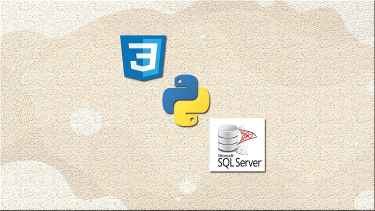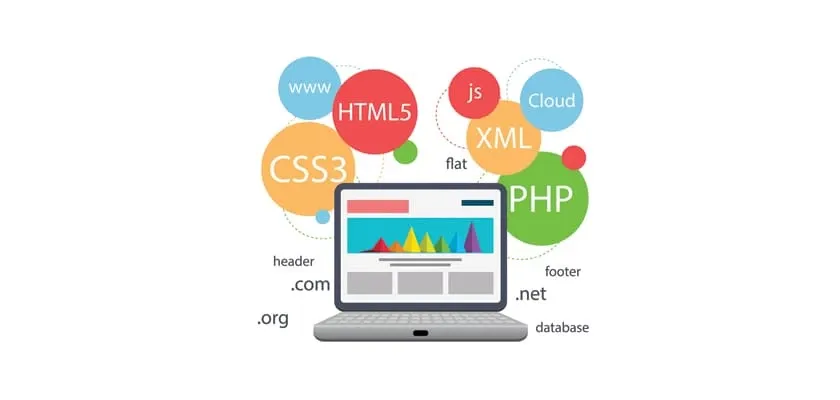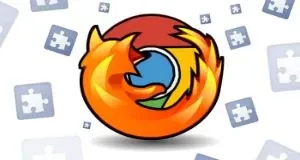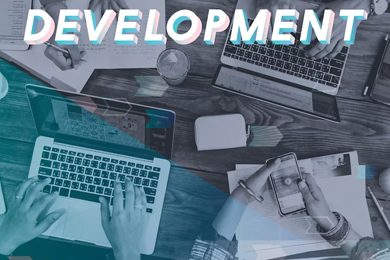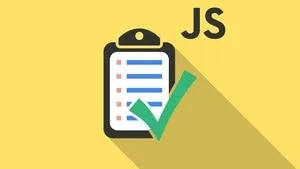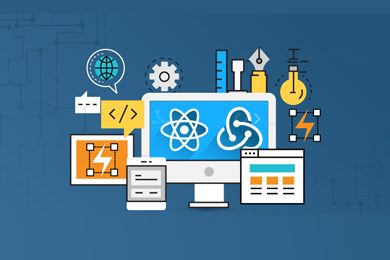This plan includes
- Limited free courses access
- Play & Pause Course Videos
- Video Recorded Lectures
- Learn on Mobile/PC/Tablet
- Quizzes and Real Projects
- Lifetime Course Certificate
- Email & Chat Support
What you'll learn?
- Build coding for Data Science applications
- Get a job as a junior web developer
- Create your own stunning, layouts for awesome websites
- Preparing Python coding for Data Science projects and Libraries
- Master client-end design using CSS, back-end development Python coding with Microsoft SQL
- Apply CSS, Python for data science and Microsoft SQL database queries on real-world tasks
- Create fully function web apps using Python, CSS and Microsoft SQL
- Write master code on machine learning and analytical programs
Course Overview
In this course, we will learn the basic tools that every Web developer needs to know. We will start from the scratch by learning how to implement modern web development with CSS, Python and Microsoft SQL.
Learn to code CSS3, Python and Microsoft SQL is The first step to Coding you need to learn to succeed in web development, it is easy to learn and understand our online CSS, Python and Microsoft SQL Training course is designed for you with the complete steps to require learn Complete Developer topics. Mr. Sekhar Metla [MCP - Microsoft Certified Professional] will explain to you even complex topics to simplify and teach you even beginners can easily understand with real-time examples.
At this Development course is without a doubt the most comprehensive web development course available online. Even if you have zero programming experience, this course will take you from beginner to mastery. Here's why:
The course is taught by the lead instructor having 20+ years of professional experience.
Become a Full-Stack Web Developer with just ONE course. Web Design and Development Complete Course with CSS, Python Programming and Microsoft SQL Database
The course has been updated to be trending technology ready and you'll be learning the latest tools and technologies used at large companies such as Apple, Facebook, Google and Netflix.
What is Python:
Python is a high-level, interpreted, general-purpose programming language. Its design philosophy emphasizes code readability with the use of significant indentation. Python is dynamically-typed and garbage-collected.
The curriculum was developed over a period of four years, with comprehensive student testing and feedback who are working and applying these coding examples.
We've taught many students how to code and many have gone on to change their lives by becoming professional developers or starting their own tech startup.
We'll take you step-by-step through engaging video tutorials and teach you everything you need to know to succeed as a web developer.
The course includes HD video tutorials and builds your programming knowledge while making real-world websites and web apps.
Throughout this comprehensive course, we cover a massive amount of tools and technologies, including:
CSS3
Front-End Web Development
Client-side style
Font styles
Box model
Animations
Forms
Shadows
Calculation
and more..
Python [Programming for Data Science]
Variables
Data types
Statements
Control flow statements
Code Development
Sequences
Sets
Tuples
Lists
Dictionaries
KW arguments
Web Design
Functions
Object oriented programming [OOPs]
Classes, Objects
Methods
Inheritance
Polymorphism
Abstraction
Access Modifiers
Encapsulation
Error Handling
and more..
Microsoft SQL
SQL installation
Database
Tables
SQL functions
SQL statements
SQL operators
SQL joins
SQL advanced
Timestamps
filtering data
analyzing data
grouping data
Reports
and more..
By the end of this course, you will be fluently programming and be ready to make any website you can dream of.
Sign up today, and look forward to:
-
HD Video Lectures
-
Code Challenges and Coding Exercises
-
Beautiful Real-World dynamic Projects
ABOUT YOUR INSTRUCTOR
Sekhar Metla is a software engineer with 20 years of professional experience. He is the author of several online-selling courses with more than 30,000+ students in many countries. He has a Master of Science in Computer Applications as Software Engineering. His students describe him as passionate, pragmatic, and motivational in his teaching.
What are you waiting join now to start learning how to make your Data Science Developer Career TODAY :)
Pre-requisites
- No programming experience needed. You will learn everything you need to know
- No software is required in advance of the course (all software used in the course is free)
- No pre-knowledge is required - you will learn from basic
Target Audience
- Beginner CSS, Python coding and Microsoft SQL developers curious about data science development
- Anyone who wants to generate new income streams
- Anyone who wants to build websites
- Anyone who wants to become financially independent
- Anyone who wants to start their own business or become freelance
- Anyone who wants to become a Full stack web developer
Curriculum 198 Lectures 19:43:21
Section 1 : Introduction
- Lecture 2 :
- How to ask great questions
- Lecture 3 :
- Introduction CSS
- Lecture 4 :
- Choosing Code Editor
- Lecture 5 :
- Installing Code Editor (Sublime Text)
- Lecture 6 :
- CSS Syntax
- Lecture 7 :
- Creating a first page with CSS Style
Section 2 : CSS Basic
- Lecture 1 :
- Inline CSS
- Lecture 2 :
- Internal CSS
- Lecture 3 :
- External CSS
- Lecture 4 :
- CSS Classes
- Lecture 5 :
- CSS IDs
- Lecture 6 :
- Colors
- Lecture 7 :
- Backgrounds
- Lecture 8 :
- Floating
- Lecture 9 :
- PosiPositioning tioning
- Lecture 10 :
- Margins
- Lecture 11 :
- Padding
- Lecture 12 :
- Borders
Section 3 : CSS Intermediate
- Lecture 1 :
- Styling Text
- Lecture 2 :
- Aligning Text
- Lecture 3 :
- Styling Links
- Lecture 4 :
- Font Styles
- Lecture 5 :
- Font Family
- Lecture 6 :
- Applying Google Fonts
- Lecture 7 :
- Box Model
- Lecture 8 :
- Icons
- Lecture 9 :
- Tables
- Lecture 10 :
- Navigation-Menu
- Lecture 11 :
- Dropdowns
Section 4 : CSS Advanced
- Lecture 1 :
- Advanced Selectors
- Lecture 2 :
- Forms
- Lecture 3 :
- Website Layout
- Lecture 4 :
- Rounded Corners
- Lecture 5 :
- Color Keywords
- Lecture 6 :
- Animations
- Lecture 7 :
- Pseudo Classes
- Lecture 8 :
- Gradients
- Lecture 9 :
- Shadows
- Lecture 10 :
- Calculations
- Lecture 11 :
- Creating Responsive Page
Section 5 : CSS Expert
- Lecture 1 :
- Button Styles
- Lecture 2 :
- Pagination
- Lecture 3 :
- Multiple Columns
- Lecture 4 :
- Image Reflection
- Lecture 5 :
- UI - UX Design
- Lecture 6 :
- Social Media Icons
- Lecture 7 :
- External CSS style adding
Section 6 : Python Introduction
- Lecture 1 :
- Introduction to Python
- Lecture 2 :
- Python vs. Other Languages
- Lecture 3 :
- Why Its Popular
- Lecture 4 :
- Command Line Basics
- Lecture 5 :
- Python Installation (Step By Step)
- Lecture 6 :
- PyCharm IDE Installation
- Lecture 7 :
- Getting Start PyCharm IDE
- Lecture 8 :
- First Python Hello World Program
Section 7 : Python Basics
- Lecture 1 :
- Variables
- Lecture 2 :
- Data Types
- Lecture 3 :
- Type Casting
- Lecture 4 :
- User Inputs
- Lecture 5 :
- Comments
Section 8 : Python Strings
- Lecture 1 :
- Strings
- Lecture 2 :
- String Indexing
- Lecture 3 :
- String Slicing
- Lecture 4 :
- String Built-in Functions
- Lecture 5 :
- Formatting String (Dynamic Data)
Section 9 : Python Operators
- Lecture 1 :
- Arithmetic Operators
- Lecture 2 :
- Assignment Operators
- Lecture 3 :
- Comparison Operators
- Lecture 4 :
- Logical Operators
- Lecture 5 :
- AND Operator
- Lecture 6 :
- NOT Operator
- Lecture 7 :
- Booleans
Section 10 : Python Data Structures
- Lecture 1 :
- Arrays in Earlier
- Lecture 2 :
- Lists
- Lecture 3 :
- Add List Items
- Lecture 4 :
- Remove List Items
- Lecture 5 :
- Sort Lists
- Lecture 6 :
- Join Lists
- Lecture 7 :
- Tuples
- Lecture 8 :
- Update tuples
- Lecture 9 :
- Join tuples
- Lecture 10 :
- Dictionaries
- Lecture 11 :
- Add Dictionary Items
- Lecture 12 :
- Remove Dictionary Items
- Lecture 13 :
- Nested Dictionaries
- Lecture 14 :
- Sets
- Lecture 15 :
- Add Set Items
- Lecture 16 :
- Remove Set Items
- Lecture 17 :
- Join Set Items
Section 11 : Python Conditional Statements
- Lecture 1 :
- If Statement
- Lecture 2 :
- If-else Statement
- Lecture 3 :
- If-elif-else Statement
- Lecture 4 :
- If Statement Coding Exercise
Section 12 : Python control flow statements
- Lecture 1 :
- Flow Charts
- Lecture 2 :
- While Loops Statement
- Lecture 3 :
- For Loops Statement
- Lecture 4 :
- The range() Function
- Lecture 5 :
- Nested Loops
- Lecture 6 :
- 2D List using Nested Loop
Section 13 : Python core games
- Lecture 1 :
- Guessing Game
- Lecture 2 :
- Car Game
Section 14 : Python Function
- Lecture 1 :
- Creating a Function
- Lecture 2 :
- Calling a Function
- Lecture 3 :
- Function with Arguments
Section 15 : Python args, KW args for Data Science
- Lecture 1 :
- args, Arbitary Arguments
- Lecture 2 :
- kwargs, Arbitary Keyword Arguments
Section 16 : Python Project
- Lecture 1 :
- Project Overview
- Lecture 2 :
- ATM Realtime Project
Section 17 : Python Object oriented programming [OOPs]
- Lecture 1 :
- Introduction to Class
- Lecture 2 :
- Create a Class
- Lecture 3 :
- Calling a Class Object
- Lecture 4 :
- Class Parameters - Objects
- Lecture 5 :
- Access Modifiers(theory)
Section 18 : Python Methods
- Lecture 1 :
- Introduction to methods
- Lecture 2 :
- Create a method
- Lecture 3 :
- Method with parameters
- Lecture 4 :
- Method default parameter
- Lecture 5 :
- Multiple parameters
- Lecture 6 :
- Method return keyword
- Lecture 7 :
- Method Over loading
Section 19 : Python Class and Objects
- Lecture 1 :
- Introduction to OOPs
- Lecture 2 :
- Classes and Objects
- Lecture 3 :
- Class Constructors
Section 20 : Python Inheritance and Polymorphism
- Lecture 1 :
- Introduction
- Lecture 2 :
- Inheritance
- Lecture 3 :
- Polymorphism
- Lecture 4 :
- Assessment Test
- Lecture 5 :
- Solution for Assessment Test
Section 21 : Python Encapsulation and Abstraction
- Lecture 1 :
- Introduction
- Lecture 2 :
- Access Modifiers (public, protected, private)
- Lecture 3 :
- Encapsulation
- Lecture 4 :
- Abstraction
Section 22 : Python OOPs Games
- Lecture 1 :
- Dice Game
- Lecture 2 :
- Card and Deck Game Playing
Section 23 : Python Modules and Packages
- Lecture 1 :
- PIP command installations
- Lecture 2 :
- Modules
- Lecture 3 :
- Built-in Modules
- Lecture 4 :
- Packages
- Lecture 5 :
- Reading CSV files
Section 24 : Python Error Handling
- Lecture 1 :
- Errors – Types of Errors
- Lecture 2 :
- Try - Except Exceptions Handling
- Lecture 3 :
- Try-Except-Finally Blocks
Section 25 : Microsoft SQL Introduction
- Lecture 1 :
- Introduction
- Lecture 2 :
- Overview of Databases
- Lecture 3 :
- MSSQL Installation
- Lecture 4 :
- MSSQL SSMS Installation
- Lecture 5 :
- Connecting to MS-SQL (Windows Authentication)
- Lecture 6 :
- Connecting to MS-SQL (SQL Server Authentication)
Section 26 : MS SQL Statements
- Lecture 1 :
- SQL statement basic
- Lecture 2 :
- SELECT Statement
- Lecture 3 :
- SELECT DISTINCT
- Lecture 4 :
- Column AS Statement
- Lecture 5 :
- COUNT
Section 27 : MS SQL Filtering Data
- Lecture 1 :
- SELECT WHERE Clause – One
- Lecture 2 :
- SELECT WHERE Clause – Two
- Lecture 3 :
- ORDER BY
- Lecture 4 :
- TOP in MSSQL
- Lecture 5 :
- BETWEEN
- Lecture 6 :
- IN Operator - Condition
- Lecture 7 :
- LIKE
Section 28 : MS SQL Functions
- Lecture 1 :
- Overview of GROUP BY
- Lecture 2 :
- Aggregation Function – SUM()
- Lecture 3 :
- Aggregation Function – MIN()-MAX()
- Lecture 4 :
- GROUP BY – One(theory)
- Lecture 5 :
- GROUP BY – Two(practical)
- Lecture 6 :
- HAVING
Section 29 : MS SQL Joins
- Lecture 1 :
- Overview of JOINS
- Lecture 2 :
- Introduction to JOINS
- Lecture 3 :
- AS Statement
- Lecture 4 :
- INNER Join
- Lecture 5 :
- Full Outer Join
- Lecture 6 :
- Left Outer Join
- Lecture 7 :
- Right Outer Join
- Lecture 8 :
- Union
Section 30 : MS SQL Advanced commands
- Lecture 1 :
- Basic of Advanced SQL Commands
- Lecture 2 :
- Timestamp
- Lecture 3 :
- Extract from Timestamp
- Lecture 4 :
- Mathematical Scalar Functions
- Lecture 5 :
- String Functions
- Lecture 6 :
- SubQuery
Section 31 : MS SQL Structure and Keys
- Lecture 1 :
- Basic of Database and Tables
- Lecture 2 :
- Data Types
- Lecture 3 :
- Select Datatype on SSMS
- Lecture 4 :
- How to set Primary Key
- Lecture 5 :
- How to set Foreign Key
- Lecture 6 :
- Create Table using SQL Script
Section 32 : MS SQL Queries
- Lecture 1 :
- Insert query
- Lecture 2 :
- Update query
- Lecture 3 :
- Delete query
Section 33 : MS SQL Structure queries
- Lecture 1 :
- Alter Table
- Lecture 2 :
- Drop Table
Section 34 : MS SQL Constraints
- Lecture 1 :
- Check Constraint
- Lecture 2 :
- NOT NULL Constraint
- Lecture 3 :
- UNIQUE Constraint
Section 35 : MS SQL Backup and Restore
- Lecture 1 :
- Overview of Database and Tables
- Lecture 2 :
- Creating a Database backup using SSMS
- Lecture 3 :
- Restoring a Database from backup using SSMS
Our learners work at
Frequently Asked Questions
How do i access the course after purchase?
It's simple. When you sign up, you'll immediately have unlimited viewing of thousands of expert courses, paths to guide your learning, tools to measure your skills and hands-on resources like exercise files. There’s no limit on what you can learn and you can cancel at any time.Are these video based online self-learning courses?
Yes. All of the courses comes with online video based lectures created by certified instructors. Instructors have crafted these courses with a blend of high quality interactive videos, lectures, quizzes & real world projects to give you an indepth knowledge about the topic.Can i play & pause the course as per my convenience?
Yes absolutely & thats one of the advantage of self-paced courses. You can anytime pause or resume the course & come back & forth from one lecture to another lecture, play the videos mulitple times & so on.How do i contact the instructor for any doubts or questions?
Most of these courses have general questions & answers already covered within the course lectures. However, if you need any further help from the instructor, you can use the inbuilt Chat with Instructor option to send a message to an instructor & they will reply you within 24 hours. You can ask as many questions as you want.Do i need a pc to access the course or can i do it on mobile & tablet as well?
Brilliant question? Isn't it? You can access the courses on any device like PC, Mobile, Tablet & even on a smart tv. For mobile & a tablet you can download the Learnfly android or an iOS app. If mobile app is not available in your country, you can access the course directly by visting our website, its fully mobile friendly.Do i get any certificate for the courses?
Yes. Once you complete any course on our platform along with provided assessments by the instructor, you will be eligble to get certificate of course completion.
For how long can i access my course on the platform?
You require an active subscription to access courses on our platform. If your subscription is active, you can access any course on our platform with no restrictions.Is there any free trial?
Currently, we do not offer any free trial.Can i cancel anytime?
Yes, you can cancel your subscription at any time. Your subscription will auto-renew until you cancel, but why would you want to?
Instructor

518764 Course Views
68 Courses



 Tech & IT
Tech & IT
 Business
Business
 Coding & Developer
Coding & Developer
 Finance & Accounting
Finance & Accounting
 Academics
Academics
 Office Applications
Office Applications
 Art & Design
Art & Design
 Marketing
Marketing
 Health & Wellness
Health & Wellness
 Sounds & Music
Sounds & Music
 Lifestyle
Lifestyle
 Photography
Photography




